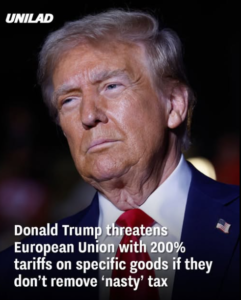Former President Donald Trump has issued a stark warning to the European Union (EU), threatening to impose 200% tariffs on specific goods if the bloc refuses to remove what he described as a “nasty” tax. This tax, which Trump referred to in his statement, is part of the EU’s Green Deal and related carbon border adjustment mechanisms, which aim to impose higher tariffs on goods imported into the EU from countries with lower environmental standards. Trump’s warning underscores ongoing tensions between the U.S. and Europe regarding trade, environmental regulations, and the economic impacts of these policies.
The Tax in Question
The “nasty” tax Trump referred to is part of the EU’s Carbon Border Adjustment Mechanism (CBAM), a key element of its Green Deal. This policy was introduced to tax imports based on their carbon footprint, ensuring that goods coming into the EU from countries with lower environmental standards face higher tariffs. The EU’s goal is to prevent what is known as carbon leakage, where businesses might relocate to countries with laxer environmental laws to avoid high production costs. Under the mechanism, industries such as steel, aluminum, cement, and chemicals are likely to be most affected.
Trump has been critical of environmental taxes in the past, especially those he believes hurt American industries. He contends that the CBAM unfairly targets U.S. manufacturers and could harm American consumers by driving up prices on a variety of goods. In his remarks, Trump claimed that these tariffs could raise prices significantly for American consumers, particularly for products like automobiles and energy-intensive goods, if applied to U.S. exports.
Trump’s 200% Tariff Threat
In a recent statement, Trump threatened the EU with 200% tariffs on products like luxury goods, cars, and agriculture if the CBAM tax was not removed. He positioned the potential tariffs as a response to what he deemed an unfair trade policy that would hurt American workers and industries.
“We cannot stand by while the EU punishes our farmers and workers with this nasty tax,” Trump said, adding, “If they don’t remove it, we’ll impose massive tariffs on their goods. **200% tariffs on their products will make their luxury cars and wine too expensive for anyone in the U.S. to buy.”
Trump’s proposed 200% tariffs would have a devastating impact on European industries, particularly luxury goods like wine, cheese, and high-end automobiles. With the U.S. being one of the biggest markets for European exports, such tariffs could cripple European companies reliant on American sales.
Potential Consequences for Both Sides
Trump’s threat to impose these heavy tariffs could have a far-reaching economic impact:
- American consumers would face higher prices for European goods, particularly luxury products such as French wine and Italian cars.
- European exporters would likely see a sharp decline in demand for their goods in the U.S., as the higher costs would price many consumers out of the market.
- U.S. industries affected by the CBAM would have to find ways to either reduce carbon emissions or absorb the higher costs. The EU’s green policies could force U.S. manufacturers to adapt to stricter environmental standards, a long-term challenge for many sectors.
- Diplomatic tensions between the U.S. and the EU would likely intensify, with both sides potentially engaging in retaliatory trade measures, further complicating the global economic landscape.
Reactions from European Leaders
European officials have already responded to Trump’s statements, warning that retaliation is possible if he follows through with his tariff threats. European Commission President Ursula von der Leyen called Trump’s threat “a misunderstanding of our intentions.” She argued that the CBAM was not aimed at punishing countries but rather at promoting fair competition in the global market by ensuring that countries with lower environmental standards do not gain an unfair trade advantage.
Von der Leyen also stated that the EU’s trade policies are consistent with the World Trade Organization (WTO) rules and that Europe would be prepared to defend them against any challenges.
Conclusion
Trump’s 200% tariff threat represents a high-stakes escalation in global trade tensions, with the EU and the U.S. potentially heading toward another trade war over environmental policies and tax regulations. The consequences for both sides could be profound, especially for industries dependent on international trade. With both sides digging in their heels, it remains to be seen how this conflict will unfold and whether compromise or further retaliation is on the horizon.


